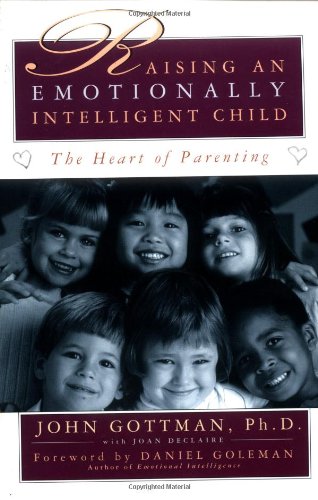Raising An Emotionally Intelligent Child: The Heart of Parenting

Raising An Emotionally Intelligent Child: The Heart of Parenting
by John Gottman
Reviewed by Erin Pridgen
There is an an abundance of parenting books in bookstores these days telling parents how they should be raising their children. However, there are about as many different parenting techniques as there are children in the world. There will never be a “one size fits all” model for parenting. However, John Gottman presents a style of parenting that provides a solid foundation for parenting success throughout childhood and adolescence. In his book, Raising and Emotionally Intelligent Child, Gottman describes a parenting style called the Emotion Coach. The Emotion-Coaching parent serves as a guide for children through their emotional world. These parents show an acceptance of their child’s emotional world while still setting limits on inappropriate behavior and aiding in teaching and enhancing emotion regulation, using appropriate emotional expression, and problem solving. In other words, Emotion Coaching parents raise emotionally intelligent kids.
Throughout this book, Gottman describes the different parenting styles and how they can pose problems for children later in life and often will bring out more problems behaviors than eliminate them. He even provides a short assessment near the beginning of the book to help one assess their parenting style. The main purpose of the book, however, is to walk through the 5 steps that emotion coaching parents use to raise emotionally intelligent children. These 5 steps are: 1. being aware of the child’s emotions, 2. recognizing the emotion as an opportunity for intimacy and teaching, 3. listening empathically and validating the child’s feelings, 4. helping the child verbally label emotions, and 5. setting limits while helping the child problem solve. While these steps might seem simple on the surface, Gottman takes his time explaining the purpose, importance and best application for each.
The strengths of this book lie in the details, parenting style assessment, and application of his 5 steps. While he does present a fair amount of research at the beginning of the book, the bulk of the book focuses on the 5 steps. He is also most helpful with his list of Do and Don’t strategies, addressing the important role of fathers, and in addressing how to use the steps with children from infancy to being teenagers. The idea of emotion coaching is a great tool for all parents to have and one I often use and teach in my own counseling practice.
The purchase of this recommended book using the link above will contribute to the funding of The Summit Society and benefits our ministry of care for those in need.



